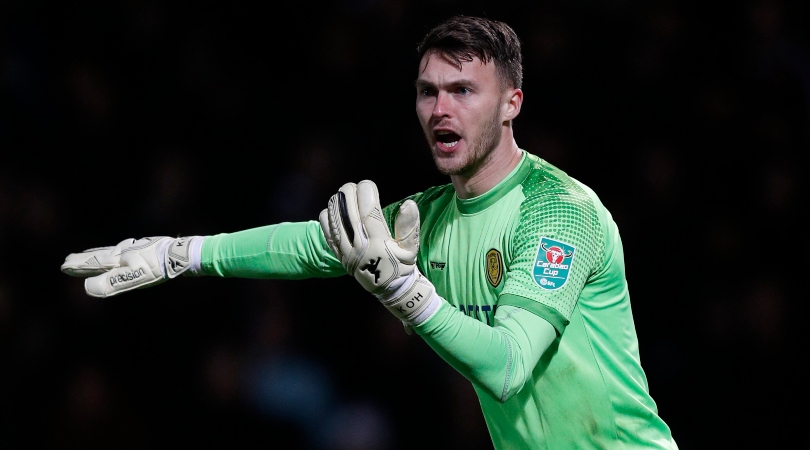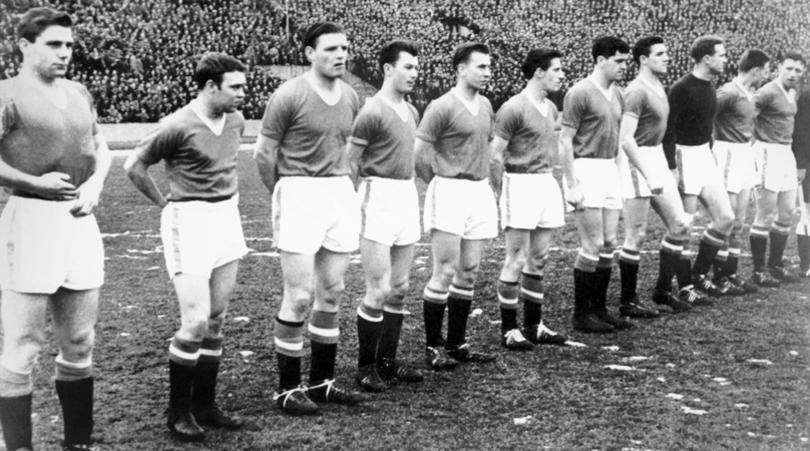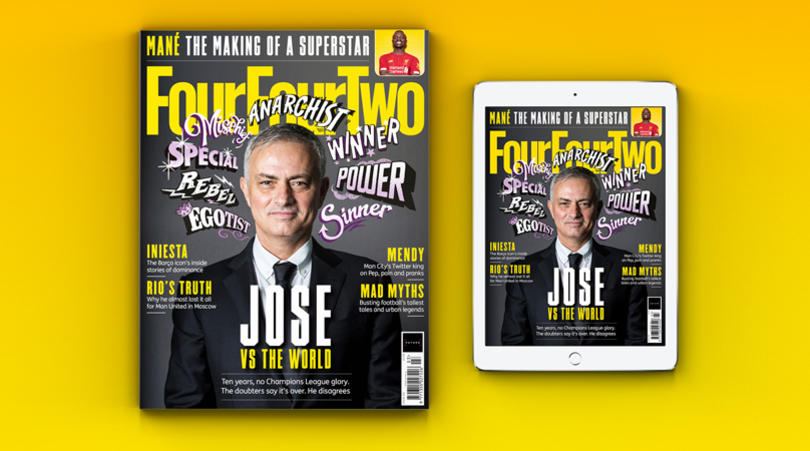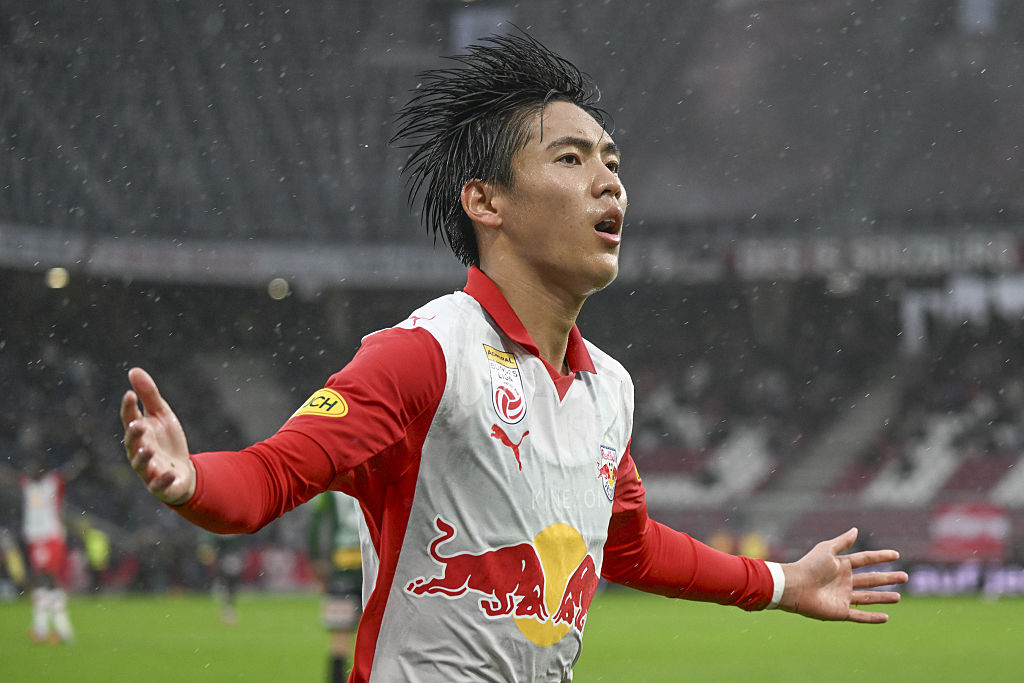Andy Mitten column: “I’ll never give up the dream of playing for Man United” – can Kieran O’Hara provide competition at Old Trafford?
FourFourTwo meets the young goalkeeper who is on loan at League One Burton Albion, has represented Ireland, and still has designs on making it in Manchester

Life moves slowly in Burton upon Trent. The headlines in the Burton News last week, when FourFourTwo went to see Kieran O’Hara, were about the passing of a popular newsagent and two trees being cut down in the town centre. Yet the town famous for breweries is home to one of football’s most successful clubs of the last decade.
There’s no way Burton, for so long a non-league club, should have risen as high as the Championship but they did, they stayed up for two seasons until 2018 and they’re now comfortable in League One. Far bigger and wealthier clubs would love to have done what Nigel Clough’s team have managed on average crowds of 3,500, but Burton, who train in the shadow of the vast Pirelli tyre factory, has a fine reputation for using young players well and a superb team spirit under Clough.
That reputation is one reason why Manchester United and Republic of Ireland goalkeeper Kieran O’Hara, 23, had no qualms about going on loan there this season. It’s a move which has worked out and he’s played every minute of every league game for the side which is just outside the play-offs. O’Hara is a Manchester lad and tells us about his story so far.
“You support who your dad supports and my dad was a massive Man United fan,” explains the goalkeeper in a Costa Coffee close to the training ground. “Dad tells me stories about going to the games with his mates. They went home and away, to Europe too. I grew up very close to Old Trafford and went to school in Stretford. My friends were all United fans and I started going to games with dad.”
Watching football had to take a back seat when O’Hara junior started playing.
“I was a bit of a handful as a kid,” he says. “My parents were trying to get me into a sport where I could use some energy. Mum saw an advert for a local football team so I went to Urmston Town on the Sunday and started playing there aged seven. I was a goalkeeper who loved diving around and getting dirty. A United scout came to a game in Stretford, looked at my parents and saw that dad was tall, six four. I was invited to a training session at the Cliff but I was too young to sign. From the age of eight I’ve been with United. I went to the Cliff twice a week while continuing to work hard at school.”
O’Hara achieved three As, an A star, four Bs and a C in his GCSEs because he did not neglect his studies.
The best features, fun and footballing quizzes, straight to your inbox every week.
“I wanted to be a footballer but education was important and I enjoyed school. My friends went to United games and still do, most of them are Salford lads. I wanted to do A Levels but I was offered a half scholarship at Man United. Michael Keane had completed one – studying while playing. I sat an extended diploma in business rather than A Levelsat Ashton on Mersey where other United players go. That meant I could play and study every day.”
O’Hara was fortunate to live only a mile from United’s training ground in Carrington.
“There were boys coming from North Wales and Huddersfield. Josh Brownhill (Burnley), Ashley Fletcher (Middlesbrough), Josh Harrop (Preston) and James Wilson (Salford City) were in my age group. Marcus Rashford was a little younger but he’d play above his age group. He always had something special. Paul McGuinness, our coach, was big on mixing age groups in training. He also liked ‘the cage’, an enclosed pitch about the size of a five a side pitch where the ball never went out of play and you couldn’t lose concentration which is vital for a goalkeeper. The ball came off the boards or the roof and Rashford stood out in the cage. He was agile, light and finished better than anyone. Paul Pogba would join in and was really competitive. We’d play 11-a-aside in there which meant you had no time at all and had to be quick. People would shoot from everywhere so you had to be alert.
Eric Steele, the goalkeeping coach, who was keen on young goalkeepers being involved with the first team goalkeepers made sure that O’Hara was included. “From the age of 16 I was invited to train with Edwin van der Sar, my hero. I couldn’t take my eyes off him in training. He was so big and always so relaxed and calm, even when he spoke to you. Edwin was starting to do coaching and would do a lot with me. Getting advice from him was incredible and that just didn’t come from listening to him but watching him. I’d watch United games and study Van der Sar and his positioning when the ball was in play. I’d look at the angles he gave to centre halves and how he commanded his area. He’s one of the best goalkeepers ever.”
O’Hara was offered a professional contract at 17, but at 16 United encouraged him to play at Trafford FC, a thriving non-league team based between his house and Carrington.
“Men’s football,” smiles O’Hara. “I wasn’t ready for it but I wanted it and I needed to play football which wasn’t going to happen much at United. That’s the inconsistency of youth football. Trafford were offering me 40 games a season so I went to watch my first game, a night match in the rain. I liked it, you don’t play many night matches as a youth footballer. The game was tough; there were 200 fans there. The pitch was beautiful. Paul McGuinness said that playing for Trafford would be good for me and I trusted that judgement. He was right.”
O’Hara spent a season at Trafford.
“I was a kid, I was skinny but the lads looked after me. I had mental strength too and was fine playing at the level. We played Altrincham in an FA Cup game and it felt like the big time to me, it really meant something. Brian McClair came to watch me too and Alan Fettis, my goalkeeping coach, never stopped encouraging me and he’s been a massive part of my development.”
O’Hara went on loan the following season, 2015, to Morecambe.
“I was 17 and Morecambe needed a number two,” he says. “Playing for a Football League club appealed, the idea of playing even one Football League game. I didn’t know where Morecambe was but I was soon driving up there in a carpool from the Trafford Centre. I worked hard in training and loved it there, even though I was sitting on the bench. I felt ready to play but I didn’t play. That Football League debut was elusive.”
Stockport County of the Conference North offered O’Hara a loan.
“It was a league up from Trafford, I played immediately and cleared a ball on my debut. The clearance had distance but not height. A player struck it over my head and it went in. I was thinking ‘sh*t’. I conceded four and didn’t play well. I felt shit. I was at an age where your career can go either way. It’s that ‘Is he good enough to be professional?’ age. I called mum who doesn’t go to games. She said that I’d be OK. And maybe it was going to be ok.”
O’Hara was dropped for the next County game and the month long loan ran out. Stockport wanted him back.
“I didn’t want to go back as I wanted to play, but Jim Bentley rang me from Morecambe again. He wanted me on loan and I was happy to go there to get that Football League debut. The number one, Barry Roche, was experienced but wasn’t feeling well for a game at Northampton away.”
His league debut finally had arrived.
“I was quiet on the way down but looking forward to it,” he recalls. “We lost but I had a good game and the manager said he was proud of me. I felt incredible and the lads were saying ‘you’re a bit louder than you were on the way down’. I didn’t play again for a few months after until Barry was sent off at Leyton Orient. That’s when I came on to face a penalty, guessed the right way and the ball hit my shin and went over the bar. The lads were jumping all over me and the roar of the crowd made me feel like there were 20,000 people watching when it was probably 5,000. I made four or five world class saves that day and I’ve saved them on my phone. My adrenalin was pumping but then I conceded an own goal. Deflection off a defender. I was distraught. All those saves for nothing.”
O’Hara stayed in the first team as Roche was suspended.
“I made one save in the last minute to keep a game at 1-1. I swear it was the best feeling in my life and I wanted more.”
He’d have to wait. O’Hara returned to United with six league games to his name while a teenager to join United’s under-23s.
“I was playing against young players in Premier League stadiums,” he says. “The games aren’t always great but you’re against quality young players who are quick and sharp, some of whom are going to play at the top level. I signed a new deal at United and played another 20 or 30 games with the reserves. I also trained each day with the first team, which was amazing.”
O’Hara would watch David de Gea closely.
“David’s so sharp. He’s lightning fast, scarily so. His reactions make him such a good shot stopper. David’s amazing with his feet, he’s composed, relaxed, strikes the ball and reads the game well. He’s also got massive hands which isn’t a bad thing for a ‘keeper. I’d watch what he was doing and try to take that into reserve games. It made a difference and I was nominated for player of the season. Sergio Ramos is very good too. Going to Tranmere on a bad pitch in an FA Cup game isn’t easy, but he’s solid, relaxed and commands his area well. Good distribution too.”
O’Hara trained a lot with current Sheffield United goalkeeper Dean Henderson and current West Brom goalkeeper Sam Johnstone.
“They were both very helpful to me and their route was the one I wanted to take and the one I’m taking. I’ve watched them go on loan and then climb up and up. They’ve both been successful and I want to put that into my game.”
O’Hara went to Macclesfield Town last season.
“The shirt was there to make my own. I had outgrown the U23 games and wanted to be playing regularly in the Football League. My focus was getting in the Macclesfield team, which I did. And putting in good performances which I did. My wages were covered by United but it wasn’t so simple for the other players.”
Macclesfield’s players went months without being paid last season and the team were adrift at the bottom, football’s 92nd club.
“I was thinking ‘wow’. Lads were telling me they couldn’t make mortgage payments, that they need their win bonus. I was living at home and getting paid. They hadn’t won a game having been promoted and it felt like the win wasn’t going to come. The players didn’t know how to win and it was difficult.”
Not that O’Hara was used to winning.
“I’d never won a league game and hadn’t kept a clean sheet,” he laughs. “I was improving as a goalkeeper – it actually helped me being outside of my comfort zone in a losing team.”
People were noticing O’Hara and he was called up to the Republic of Ireland at under-21 level; but at club level Macclesfield remained rocky.
“The manager was sacked and his assistant took over. I didn’t know if it was him or the manager who signed me. I was out of the team for five games and told the caretaker manager that I should be playing. I came in for a game at MK Dons, then we beat Yeovil. My first win and my first clean sheet. A switch flicked on for me that day.”
Sol Campbell arrived as Macclesfield manager, with the team still adrift at the bottom.
“Nobody was tonking us and, maybe I’m being naïve, but I didn’t feel we would go down,” says O’Hara. “We played Notts County away on Boxing Day and they were down there. We would have gone down had we lost that - we beat them 2-1, a late winner. Buzzing. Sol’s a good manager. He sorted out eating, our schedules. Everyone was on the same page and results picked up. Andy Cole was setting up the striking drills and was a help. We needed a point on the last day to stay up and we got it. Brilliant.”
O’Hara won players’ player, fans’ player and manager’s player of the season. He’s played 42 games for a League Two club. In the summer, Burton manager Nigel Clough called him. It was another chance to step up. Clough had called around for character references on O’Hara. The goalkeeper who Andy Cole described as “a really nice kid and a very good young pro” couldn’t have been better.
“The first few games were difficult in League One,” explains O’Hara. “Ipswich are a big club but we held our own. We’re doing well now, I’ve made the shirt my own; I’m adding things to my game. I’m responsible for my development more than anyone.”
O’Hara’s also made his full debut for Ireland in September.
“Terry Connor (the Ireland assistant manager) watched me here against Leicester in the Carabao Cup and I had a good game. I was grateful that my performances here were recognised. I like it here at Burton. The manager knows exactly what he’s doing and trusts the staff around him. He’s got a lot of good people here playing which adds to the team spirit.”
O’Hara wants his upward trajectory to continue, to play in higher leagues until he reaches the top. Life for now is home in south Manchester and 90 minute drives to Burton. He stays over in Burton once a week.
“I’ve adapted as well as I could have possibly hoped,” he said, “but nothing is guaranteed in football. I believe in myself and I’ll never give up on the dream of playing for Manchester United.
“I’ll work on any weakness. Players can be embarrassed to practice what they’re weak at because they think it’s a sign of weakness. Not me. I owe it to myself to play at the highest level possible in football.”
O’Hara is in the last year of his United contract, though the club have an option to extend it. Competition is tough but he’s a keeper, alright.
While you’re here, why not take advantage of our brilliant subscribers’ offer? Get the game’s greatest stories and best journalism direct to your door for only £12.25 every three months – less than £3.80 per issue! Save money with a Direct Debit today
NOW READ
EXCLUSIVE Andres Iniesta: I pleaded with Pep Guardiola to stay true to beliefs at Barcelona
QUIZ Can you name Mauricio Pochettino's top appearance makers for Tottenham and Southampton?
GUIDE Premier League live stream best VPN: how to watch every game from anywhere in the world

Andy Mitten has interviewed the likes of Lionel Messi, Eric Cantona, Sir Alex Ferguson and Diego Maradona for FourFourTwo magazine. He also founded and is editor of United We Stand, the Manchester United fanzine, and contributes to a number of publications, including GQ, the BBC and The Athletic.
 Join The Club
Join The Club







